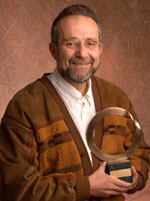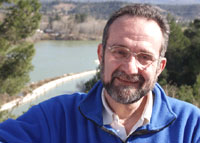Economics professor Pedro Arrojo-Agudo, who teaches at the University of Zaragoza in Spain, is using his academic expertise to battle a monster: the National Hydrological Plan, a $25 billion project that would build 120 dams on the Ebro River. The dams would submerge entire towns along Spain’s second-longest river, displace tens of thousands of rice and fish farmers, and poison the wetlands of the river delta with salt. Arrojo-Agudo’s analyses have shown that the project makes little environmental, social, or economic sense.

Pedro Arrojo-Agudo.
Photo: Goldman Environmental Prize.
So Arrojo-Agudo, 52, has stepped off campus to organize an enormous grassroots movement. In recent months, hundreds of thousands of people have gathered in Barcelona, Madrid, and Zaragoza to protest the project. This mass movement is particularly striking in Spain, where the fascist dictator Francisco Franco ruled from 1939 to his death in 1975. “In the 60s and 70s we had no freedom,” says Arrojo-Agudo. “There was no discussion about policy or social issues. So the discussion that happened in the U.S. during those years is the same discussion we are having now.”
Arrojo-Agudo is the founder of the nonprofit Iberian Congress on Water Planning and Management and the Foundation for a New Culture of Water. On April 14, he was awarded one of six 2003 Goldman Environmental Prizes for his work to stop the National Hydrological Project. He spoke to Grist from his home in Zaragoza, Spain, the day before another planned protest in Barcelona.
I understand you did an economic analysis of the National Hydrological Plan. How did that analysis convince you to oppose the project?
When I made the calculations, the results were so extremely negative that I didn’t believe it. I thought, “I am wrong, there is some mistake in here.” But I consulted with other colleagues, and their results were the same. At the same time, I was visiting the area that would be affected and talking to the people.
The people who are under this threat, they cannot talk to you without weeping, and seeing that gave me a very, very deep feeling. So I was convinced from the reasonable, rational point of view and also from the heart.
Is the NHP funded entirely by the government or are private companies involved as well?
In the United States, you have invented the expressions “perverse subsidies” and “pork barrel,” no? In Spain, it is the same. We’ve spent a century building and building, and at first it was needed, but now it’s for the benefit of some big companies, for the pork barrel. Public funds cover big infrastructures, they’re built in the name of public interest, but finally you find that the public interest is really the private interest. It’s a little bit like the movie “Chinatown”: The pretext is the benefits for the farmer, but the real reason is urban speculation and intensive agribusiness. In Spain, the real, final objective of this project is tourism development on the Mediterranean coast.

Pedro Arrojo-Agudo exposed a river of problems.
Photo: Robert Roll.
You’ve helped rally hundreds of thousands of people to protest the project. Is the government responding?
The response has been “Quick! Quick! It’s now or never!” The reaction of the government has been very authoritarian, the president thinks everything has to be solved by force. They just say, “These people aren’t in solidarity with progress.” I used to say the hardest drug in the world is power. No matter who has the majority in Parliament — it doesn’t matter if it’s left or right wing — the people lose.
The project does need money from the European Union [Editor’s note: At least 40 percent of the funding would come from the E.U.] So we marched from Spain to Brussels to ask the E.U. not to give money to this project, that it was money for destruction. That was the first time anyone has gone to Brussels and asked for no money. [Laughs.] The European Commission has blocked funds for the last three years — that’s unprecedented — but the influence of the [national] governments is still very strong on the commission. If the commission does stop funding the Spanish plan, everything will change more easily from that moment on.
You’ve been credited with creating a new conservation movement in Europe, the New Water Culture. Can you tell me something about that?
Until now, we have seen the rebirth of canals, and aquifers being treated like mines of water. There’s not any relationship with life, with territorial identity, with so many other values that are in our culture but have been forgotten. We have to recover a way of thinking and looking at water as an ecosystem of life. I can’t think about Paris without the Seine, or about Zaragoza without the Ebro. If you think about your town or village, you will talk about the main square and the river, no? We began [our campaign] by asking for respect for the human rights of minorities threatened with flooding. Then our arguments became wider, for the right of the citizens in general to ask for respect for rivers, for our history and landscapes. There is a poet in Spain who says the river is the soul of the landscape. So we’re asking for both a change in policy and a change in culture.

We’ve involved trade unions, the ecological movement, people affected by the project, people in cities, a huge coalition of people from the left and right wing. We’ve never seen this kind of movement in Europe. When we marched to Brussels through France, we had 15,000 people arriving in Brussels by foot, bike, bus, and train. It was raining that day, absolutely flooding, and I have never been so wet. It was incredible. The New Water Culture had really arrived.
What advice do you have for other people fighting large water projects?
Often people don’t feel able to confront the huge power of the government. In Spain, people even remember being driven out of their homes by the army [during the Franco dictatorship]. So the first thing to say to them is, you are right, not just from the human point of view, but for economic, environmental, and social reasons. Once professors come and tell [the people] they are right, that [the project] is not profitable for you but only for a small group of people, they suddenly feel themselves to be much stronger. These small communities feel themselves recognized by society, and instead of the problem of the minority it becomes the problem of the majority, something society has to deal with.
What does this prize mean to you?
I feel this prize is a prize for a lot of people. I want to offer the prize to those people town by town, village by village, so I have a lot of little trips to make. I would like to use it to build bridges between people who have been divided by the government, and between the Spanish government and the European Commission. There is an expression in Spanish, Hablando se entiende la gente: By talking, you understand the people. There are a lot of new technologies and possibilities for good management, and dialogue is the key to a more positive future.

